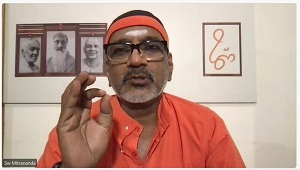On 18th April 2022, Vivekananda International Foundation (VIF) hosted the second talk on ‘Gītā for the Millennia’; an online talk series based on Śrīmad Bhagavad Gītā by Svāmī Mitrananda, Chinmaya Mission. In his introductory remarks during the event, Dr. Arvind Gupta, Director, VIF gave a brief recap of Chapter One – Viṣāda-yoga, which was discussed in the first talk. He also stated that we should gain knowledge from Gītā in order to make sense of the conflictual world.
As the first chapter of Gītā was introduced in the previous session, this session was about the second chapter of the Gītā. Given the importance, depth and length of this chapter, it will be discussed in two parts, and this talk is the first one of the two. However, a verse by verse explanation of this chapter would be yet difficult to do. Svāmīji highlighted that the second chapter gives a gist of Śrīmad Bhagavad Gītā, and the rest of the chapters are expansions of the concepts briefed in this chapter. Hence, Svāmīji advised the audience to focus on this chapter and read each verse of the chapter at least a few times before they appear for the next session.
Before getting into the second chapter, Svāmīji explained some of the important topics previously discussed in chapter one. He also said that while there are many immediate benefits that one could derive from the Gītā, like gaining confidence, overcoming fear, staying cheerful, giving clarity for decision making, etc, it's fundamental to remember these are just milestones to attain the final benefit of the Gītā, which is to transform from human to Divine, which is the real success in life. Keeping track of how far we move towards divinity is very important. This could be measured by the degree of selfishness that we keep in our life. In other words, the distance between us and God is selfishness, as selfishness produces attachment, which keeps us away from forgetting our Dharma. For instance, it was Dhṛtarāṣṭra’s selfishness and attachment to his throne and son that led him to adharma. Therefore, with constant reflections from the Gītā, we must strive to reduce our selfishness and attachments to focus on Dharma in order to attain Mokṣa.
In the first chapter, Kṛṣṇa spoke only one-word ‘paśya’ (watch) in an instance and for all the streak of excuses Arjuna gave he kept quiet. But in the second Chapter, in the second verse itself Kṛṣṇa uses strong words or lashes Arjuna to ask “…kutas tvā kaśmalam idaḿ viṣame samupasthitam anārya-juṣṭam asvargyam akīrti-karam arjuna..” In simple terms, seeing the lost Arjuna’s escapist and disgraceful tendency to run away from his responsibilities on the battlefield, Kṛṣṇa asks When did this happen to you? This is so unbecoming of an ārya (noble). In essence, Kṛṣṇa is asking us (Arjuna) when did we allow the matter to dominate the eternal spirit in us? At this juncture, Svāmīji recalled Svāmī Vivekānanda’s message to always proclaim the immortal divine within us that we often keep forgetting assuming that we are limited beings. Because it is the light within us that makes the matter outside us shine. In the subsequent verse, Kṛṣṇa tells Arjuna to quickly give up or chuck (tyaktvā) out this weakness (hṛidaya-daurbalyaṁ) and rise (uttiṣhṭha) to his own title as Vanquisher of enemies (Param-Tapa).
Svāmīji highlighted that whenever we get into a condition of helplessness, we must remember to immediately get up from that state. This is possible by developing ‘strength’, which is why Svāmī Vivekānanda has talked about it several times. This is possible by working on our body-mind coordination. Lack of focus, agitation in the mind and not being able to concentrate are indications that we lack inner strength. Losing our strength would mean forgetting that it is the divinity within us that makes the matter shine or enliven. Most of the time our body remains in one place and the mind goes elsewhere. When the mind and the body are not aligned our thoughts wander and we get exhausted by unnecessarily wasting our energy and we get mentally dissipated to lose our strength. Hence, to preserve our strength we need to do Mind-Body Alignment (MBA). While there are many yogic practices to build on this, Svāmīji suggested the simple method of doing regular japa, which could be done sitting anywhere, anytime. While doing japa, our mind is focussed on a deity and the mantra while the hand (body) moves the beads, which counts the mantra. A regular practitioner of japa will be strengthened by the deity this way. As one improves his or her Mind-Body Alignment through japa as a normative reference point, s/he will be able to take it to other fields of life to remain focussed, stable and strengthened in all situations without getting energy wasted unnecessarily.
The talk also hinted how the weak excuses that were produced by Arjuna were through some thoughts that were subconsciously inflicted by Dhṛtarāṣṭra through Sañjaya when peace talks were happening before the inception of the war. This acted as a silent psychological time bomb that blasted in Arjuna’s mind at the time of war, hearing which Dhṛtarāṣṭra burst into laughter. The man upon whom Pāṇdavas were depending on is now running away from the battlefield. But even at that moment of the sudden turn of events, Kṛṣṇa as ‘acyuta’ remains the same, smiling. After Arjuna gives his final attempt at his series of excuses beginning from the first chapter, Kṛṣṇa see through him to find out the weakness camouflaged by his seemingly logical excuses. Finally, in the seventh verse of this chapter, Arjuna surrenders unto Kṛṣṇa by accepting his ignorance and requesting him to teach him the real path. This is considered an auspicious moment in the Śrīmad Bhagavad Gītā as it is from here that Kṛṣṇa would begin his discourse. Svāmīji also highlighted that this is also the beauty of the Hindu civilization as the Guru doesn’t give knowledge unless s/he knows the disciple is already aware of her or his ignorance and is willing to surrender their ego.
The philosophical core of the Gītā begins with Kṛṣṇa’s discourse from the 11th verse of the Gītā. The significant verse goes “śhrī bhagavān uvācha aśhochyān-anvaśhochas-tvaṁ prajñā-vādānśh cha bhāṣhase gatāsūn-agatāsūnśh-cha nānuśhochanti paṇḍitāḥ” In simple terms, it means that the wise do not grieve for the dead or living. But here when Arjuna sounds ‘like a wise man’ or uses the words of wise men as he speaks, he still grieves and we know that the wise don't grieve. To make it worse, Arjuna is worrying about the people and things that don't deserve to be worried about.
From the standpoint of pure consciousness, who is dead and who is alive? Isn’t life in us, the life everywhere? For a mind of wisdom that experiences this eternal truth, there is no scope for grieving on temporary happenings or manifestations. To give an analogy, how does it sound to hear from the bubbles in the oceans, which appear and disappear complaining that they are harassed by the ocean? Svāmīji provided such analogies and thought-provoking questions to make the audience experience this verse better. To reflect on this verse further, the talk also narrated the meeting incident between Hastāmalakā and Ādi Śaṅkarācārya.
Through this verse, Kṛṣṇa reveals to Arjuna that he hasn’t experienced the wisdom but only pretends as he was speaking wisdom. Because those who have experienced the truth have no worries and perform their roles with clarity and without any dilemma. Svāmīji highlighted that this verse is foundational to understanding subsequent lectures in a better way. Hence, he advised the audience to read the commentary of this verse by his Guru, Svāmī Cinmayānanda Sarasvatī before attending the next talks (a scanned copy of the same would be circulated to the participants via email).
A worry-free life is what Vedānta offers, and reflecting on and experiencing the Gītā in our life would lead us to that state. How beautiful would it be if it becomes hard for us to remember and recollect from the past when was the last time we were worried? Leaving that bloggable question in our minds as seeds for self-inquiry, Svāmīji concluded the second session of ‘Gītā for the Millennia’ and advised the audience to strive for such a life through the means of Śrīmad Bhagavad Gītā.







Post new comment